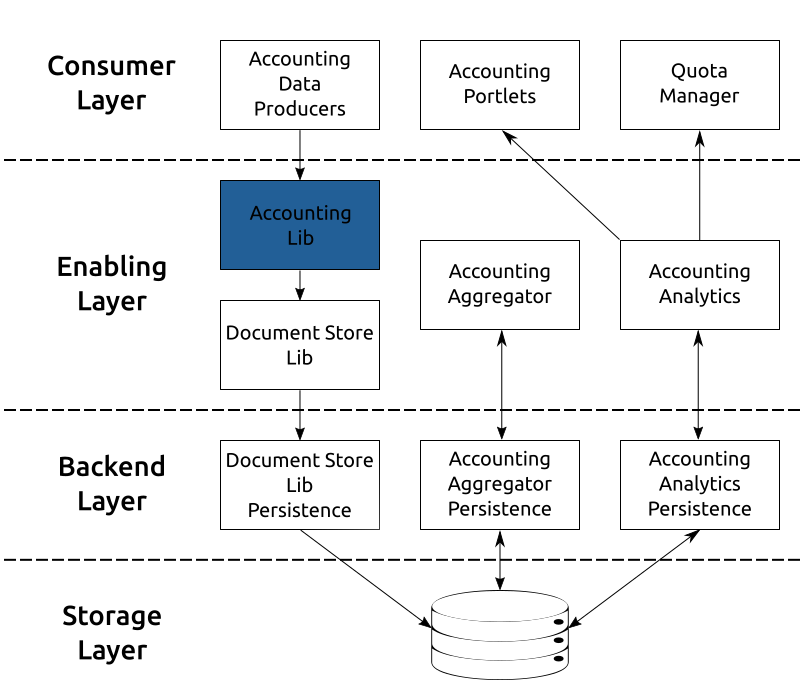Difference between revisions of "Accounting Library"
Luca.frosini (Talk | contribs) (→Collecting Usage Record) |
Luca.frosini (Talk | contribs) (→Collecting Usage Record) |
||
| Line 23: | Line 23: | ||
To set the various properties of an usage records two different methods are available | To set the various properties of an usage records two different methods are available | ||
* Developer Friendly methods (getter and setter) | * Developer Friendly methods (getter and setter) | ||
| − | * Generic Key-Value method (key:String, value:Comparable ) | + | * Generic Key-Value method (key:String, value:Comparable<? extends Serializable> ) |
For the same attribute each of the record is idempotent. This means that any of the way you are using to set a properties the value is always validated and harmonized by the same code. | For the same attribute each of the record is idempotent. This means that any of the way you are using to set a properties the value is always validated and harmonized by the same code. | ||
Different methods for different properties can be used together. | Different methods for different properties can be used together. | ||
| − | Moreover you can provide a Map<String,Comparable> to set all properties at once. | + | Moreover you can provide a Map<String,Comparable<? extends Serializable>> to set all properties at once. |
| − | + | ||
==== Usage Record Record Harmonization ==== | ==== Usage Record Record Harmonization ==== | ||
Revision as of 11:35, 1 December 2015
This component is responsible of collecting, harmonizing and storing accounting data.
Contents
Accounting Lib in the Accounting Architecture
The following image show the components discussed in this wiki page in the full Accounting Architecture:
Library
The library has been tough to provide a common way to elaborate Usage Record (UR) (see Accounting Model to check which Usage Records are supported by default). In particular is responsible for:
- Collecting
- Aggregating
- Buffering
- Storing
Collecting Usage Record
The library allow to collect Usage Records providing the following functionality:
- Attribute Validation and Harmonization
- Usage Record Validation
To set the various properties of an usage records two different methods are available
- Developer Friendly methods (getter and setter)
- Generic Key-Value method (key:String, value:Comparable<? extends Serializable> )
For the same attribute each of the record is idempotent. This means that any of the way you are using to set a properties the value is always validated and harmonized by the same code. Different methods for different properties can be used together.
Moreover you can provide a Map<String,Comparable<? extends Serializable>> to set all properties at once.
Usage Record Record Harmonization
Usage Record Record Validation
Internal Representation
Internal Facilities
Buffering & Aggregating Usage Record
The library provide bufferization capabilities. While the records are buffered for each new records requested to be accounted the library try to aggregate the new record with the one has already buffered. The aggregation made in this phase is lossless.
Storing Usage Record
- Fallback
Development
The library is identified by the following maven coordinates:
<groupId>org.gcube.accounting</groupId>
<artifactId>accounting-lib</artifactId>
Persistence
The current implementation of persistence for this library is for CouchDB storage.
<groupId>org.gcube.accounting</groupId>
<artifactId>accounting-lib-persistence-couchdb</artifactId>
Less dependency is better than more
This library must be available on every node of the infrastructure. To respect as much possible ZERO-DEPENDENCY paradigm of SmartGears a simple couchdb-connector (simple HTTP client library) has been developed.
